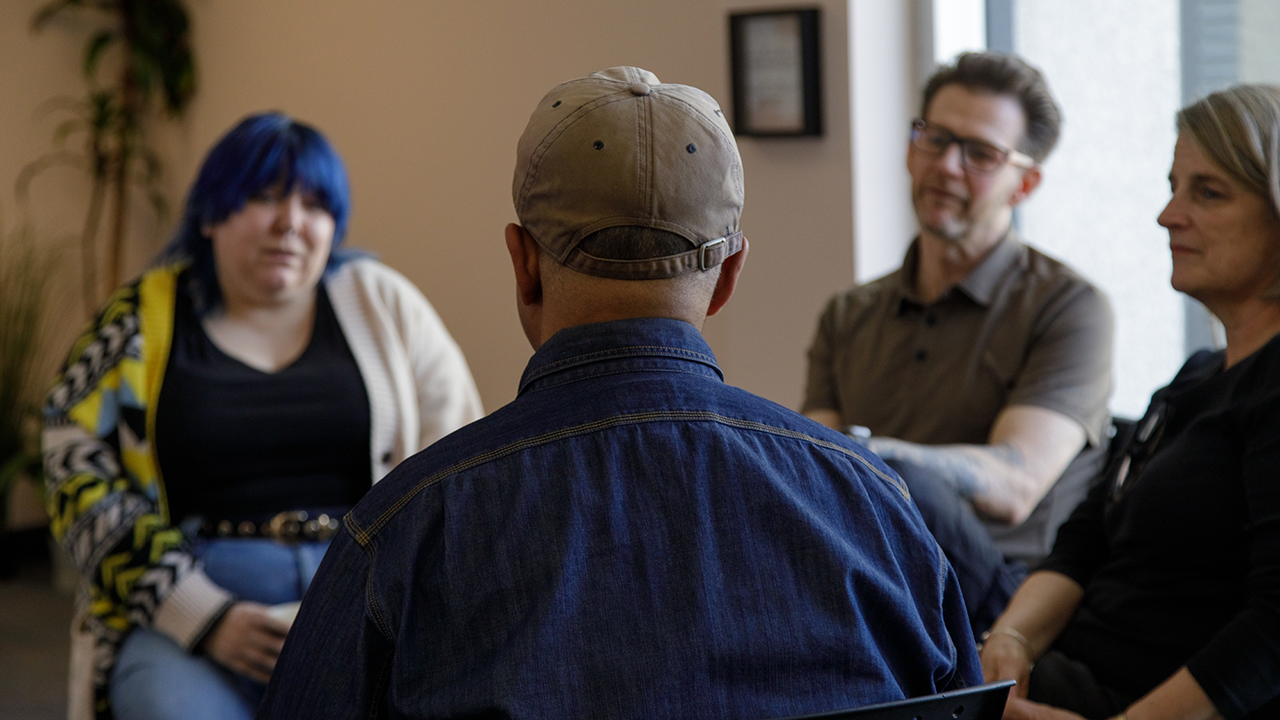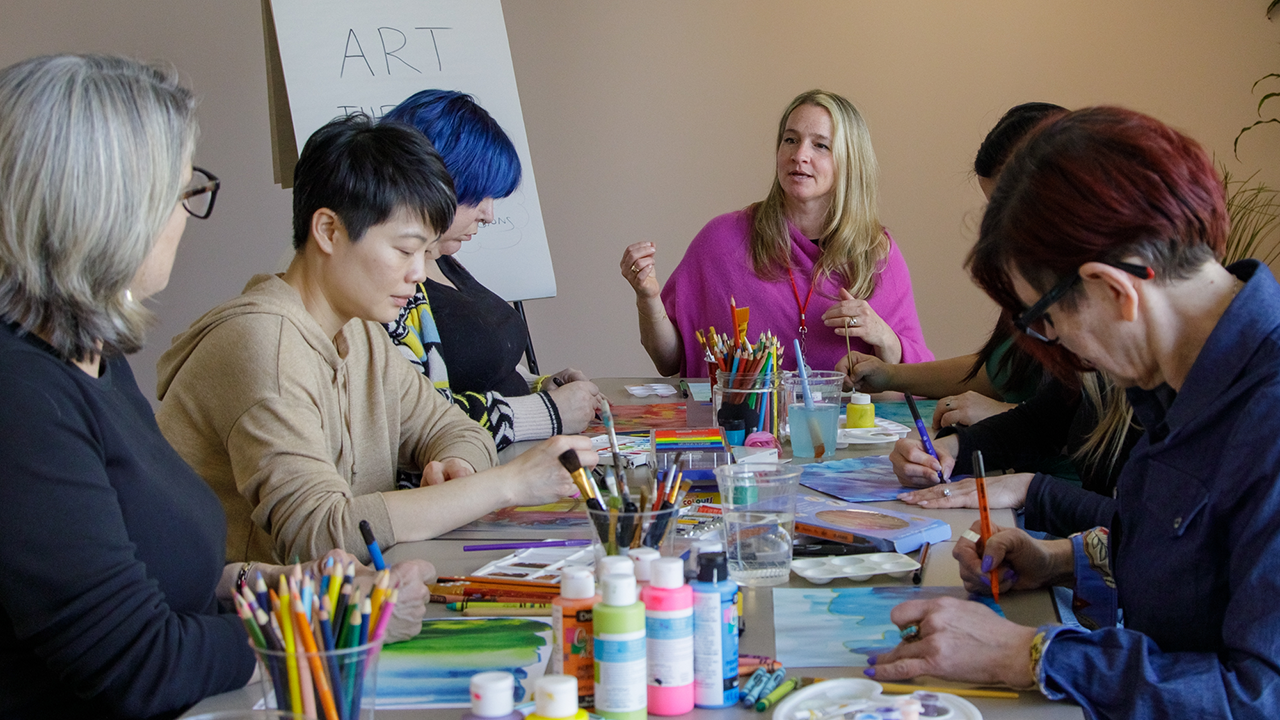
United Way is making mental health supports more accessible for everyone who needs them. Any way we can.
Content warning: This story contains discussion of a non-fatal suicide attempt.
Not long ago, Akeel was in a dark place. But today, he says he’s never been better. It hasn’t been an easy journey, but he’s finally arrived at a place of hope and stability.
In a moment of crisis, he was connected to the Canadian Mental Health Association (CMHA) Toronto, an agency funded by United Way Greater Toronto that provides mental health supports that help people develop the skills they need to live safe, healthy lives.
Akeel had lived with depression and hallucinations for nearly 15 years. When he arrived in Canada in December 2022 after fleeing political unrest in Sri Lanka, he hoped for a fresh start. Instead, the harsh winter weather, unfamiliar systems and bureaucratic delays made it hard to adjust. Each day felt like another hurdle, and the overwhelming weight of these challenges began to take its toll.
Without proper paperwork, which was delayed, Akeel couldn’t work. He relied on Ontario Works benefits, unsure when — if ever — his work permit would be approved. That uncertainty wore on him.
“I was really stressed out,” he says. “I had a hallucination, and I actually attempted suicide. The police took me and put me in a hospital.”
Akeel was terrified. At first, being hospitalized felt like being in trouble, and things seemed bleaker than ever. But looking back, Akeel now sees it as a turning point. It ushered in relief from the daily uphill battles he was experiencing and led him to the support he desperately needed.
A lifeline in a moment of crisis
At the hospital, Akeel was connected to CMHA Toronto and learned he would be assigned a case worker. “And that’s how I met Christella,” he says.
From their first call, Christella became a steady presence in Akeel’s life. They met weekly in person and spoke on the phone every other day. “She’s been there when I needed someone to talk to. It’s made a huge difference in my life,” Akeel says.
Sometimes, they talked through big decisions, coming up with next steps and action plans. Other times, Christella helped with practical needs — like tracking down a new list of food banks. “It’s about more than just food. It seems like a small thing but it’s one less thing I have to worry about,” Akeel shares.
Mental health struggles don’t often happen in isolation. That’s why we’re working tirelessly to provide supports that extend beyond direct mental health services — wraparound services that address the root causes and intersecting issues, including food security, unaffordable housing and precarious work.
And while Christella’s support was invaluable for Akeel, navigating the system isn’t always easy. That’s why we also support 211, a free, confidential service that connects people to health and social services, including mental health supports, food assistance, financial counselling and more.
Finding strength in community

Christella enrolled Akeel in another CMHA Toronto program, Pathways. CMHA Toronto is one of more than 60 United Way-funded agencies that connects more than 51,000 people like Akeel to the mental health supports they need such as counselling, crisis intervention and more.
Pathways provides group programming, peer support, skills development and leadership. “It made a big difference,” says Akeel. “Knowing that other people had been through the same experiences, and that they got through it.”
Akeel also joined the agency’s art therapy group, where participants create artwork and share their stories. “In that moment of drawing something, I don’t worry about anything else,” he says. “Everyone has their individual work, but we talk about whatever’s going on or how we’re feeling that week.”
With consistent support and new connections, Akeel began to rebuild his life. His hallucinations, once a weekly struggle, are happening less often. “Now it’s more like once a month,” he says. “I think the hallucinations were worse when I was isolating myself.”
For the first time in a while, Akeel is feeling happier and more hopeful. His paperwork is almost sorted. He’s working on a blog, writing a short book and brushing up on his typing skills. “I’m looking forward to getting a job,” he says. “Practicing typing will help me with that.”
In a recent Ontario poll, 43% of respondents reported difficulty accessing mental health services — a challenge that continues to grow with rising demand. But no one should face mental health challenges alone. That’s why United Way is rolling up our sleeves to strengthen mental health support across the GTA and ensure vital services are available and accessible when people need them most. We’re committed to using every tool that we have so that everyone has the support they need to build a better future. Any way we can.
With the right support, Akeel finally has what he hoped for — a fresh start, stability and the confidence to move forward, no longer facing his challenges alone.
Here’s where to get help if you or someone you know is struggling:
- Krasman Centre’s Warmline and Peer Crisis Support Services: 1-888-777-0979 (24/7), live chat on the website (from 10 a.m. to midnight)
- Talk Suicide Canada: 1-833-456-4566 (phone) | 45645 (text between 4 p.m. and midnight ET)
- Kids Help Phone: 1-800-668-6868 (phone), live chat counselling on the website
- Use the Canadian Association for Suicide Prevention’s directory to find a 24-hour crisis centre